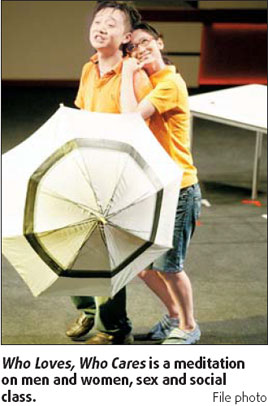British playwright David Hare's play The Blue Room, a modern adaptation of the Austrian playwright Arthur Schnitzler's Reigen, garnered international attention when it opened in London in September 1998. It was not only because it featured a briefly naked Nicole Kidman but for a daisy chain of sexual encounters, in which A sleeps with B who sleeps with C and so on until audiences finally work out way back to A with J.
The play dates back to Reigen, a drama written by Austrian playwright Arthur Schnitzler, in 1897.

Schnitzler meant to expose the decadence of his own society and since he was a doctor, it was also an exploration of syphilis. He had 10 characters of different ages and different levels of society go through a round-robin of sexual encounters, with each one reprising a partner from a previous scene.
Because of its explicit content, the play wasn't produced for 20 years - even Schnitzler himself called it "unprintable" - and the printed version was only circulated to his own friends. The Vienna police closed down the first public performance in 1921 and prosecuted Schnitzler for obscenity. It was only when Max Ophls made his famous film in 1950 that the work became better known as La Ronde.
Now a group of young Chinese writers has re-set these circular scenes of love and betrayal to the present day and renamed the play Who Loves, Who Cares. With six performers playing six relationships, the Chinese adaptation has created a fascinating landscape of dream and longing that is as eternal as Schnitzler's original series of sketches that were written over a century ago.
Dramatic, witty, warm and daring, the Chinese version avoids the sex scenes but still features characters from a wide cross-section of society and a circular story of seduction. A young and good-looking photographer has an affair with a middle-aged fashion editor but her daughter, a teenager girl falls in love with the photographer and even rushes to challenge his wife. The heartbroken full-time housewife leaves home and meets a man who breaks with his girlfriend the very day of their wedding at a small restaurant whose young owner crazily and blindly loves the fashion editor's daughter.
"This play is a brilliant meditation on men and women, sex and social class, actors and the theater. With deft insight about the gap between the sexes, it takes the treacherous Freudian subject of projection and desire and reinvents it in a bitter-sweet landscape that is both eternal and completely up-to-date," says producer Bian Wentong. "It is incredible that Schnitzler created the story a century ago. It happens every day in any big city in the world today, including Beijing."
A professor of Staging Design at the Department of Central Academy of Drama, Bian has given the play a simple but multi-functional set. At the back of the stage is a white-red tall cabinet whose sliding doors and shelves open and close to suggest different scenes.
Interestingly, the show is created by an all-women crew, including Bian, playwright Qin Wen, director Li Shan and action director Yu Xin.
"Men and women always have different views of love," says Qin. "They could never understand each other in this matter. Coincidentally, we have an all-women crew, but we try to balance each gender's point of view and hope male and female audiences learn what the other needs in love."
The show runs at the Ren Yi Experimental Theater until July 27.
(China Daily July 15, 2008)